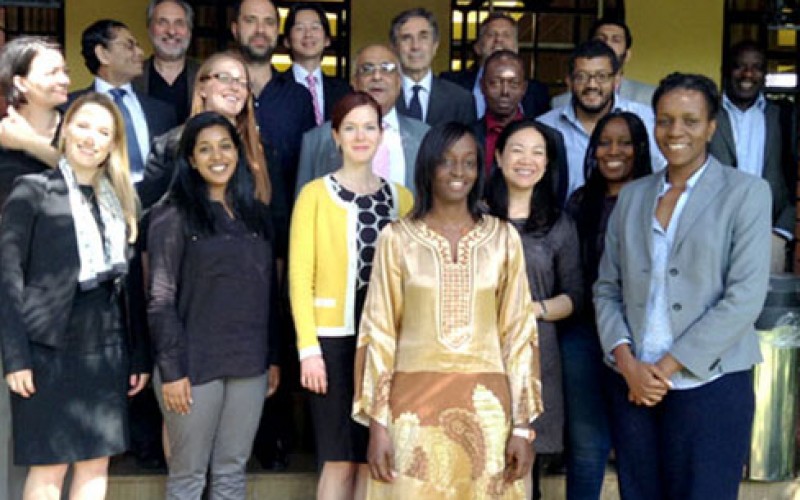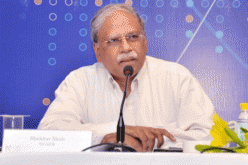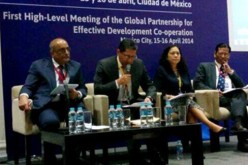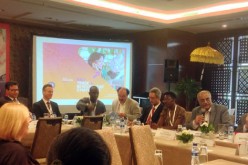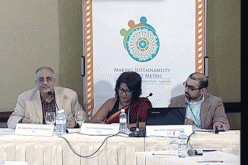Post-2015 Data Test
Unpacking the Data Revolution at the Country Level

Midterm Stock Taking Workshop
Kijiji Room, Fairview Hotel, Nairobi, Kenya
28-30 April 2014
Organised by
![]()

The workshop participants. photo: PASGR
To take stock of the implementation process across country studies so far in the Post-2015 Data Test, a two-day workshop was held during 28-30 April 2014, in Nairobi, Kenya, hosted by Partnership for African Social and Governance Research (PASGR).
As part of the Post-2015 Data Test: Unpacking the Data Revolution at the Country Level, the country-level studies are being carried out in Bangladesh, Canada, Ghana, Peru, Turkey, Senegal, Sierra Leone and Tanzania.
CPD and North-South Institute (NSI), Canada, and Southern Voice on Post-MDG International Development Goals are the core members of the Post-2015 Data Test Initiative.
During the workshop, researchers met with experts on the post-2015 development agenda and the data revolution to discuss experiences to date, lessons learned, how to address challenges arising from the implementation of the study and next steps.
Representatives from each country team, the UN system, the OECD and research institutions such as the Overseas Development Institute participated in this event.
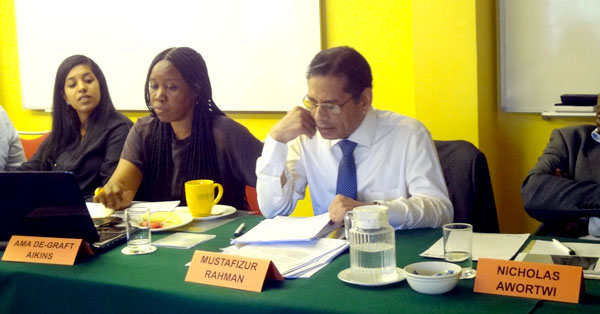
Professor Mustafizur Rahman. photo: PASGR
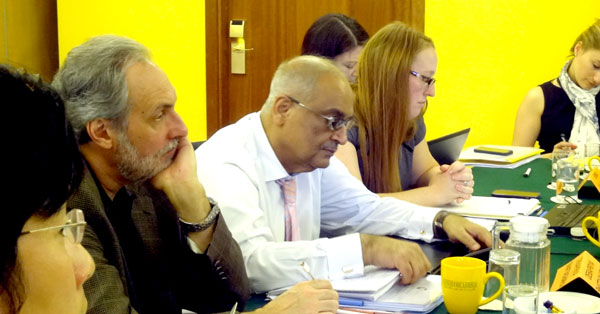
Dr Debapriya Bhattacharya. photo: PASGR
| Day-1: Monday, 28th April, 2014 | ||
| Welcome by PASGR (Joseph Hoffman) | ||
| Introductions by SV/CPD/NSI | ||
| Dinner Speaker- Minh-Thu Pham, UNF “Current Status of Post-2015 Processes and the Unfolding Scenarios” |
||
| Day-2: Tuesday, 29th April, 2014 | ||
|
|
||
| 09:30 – 11:00 | Session One: Country studies and lessons learnt | |
| Chair: Molly Elgin-Cossart, New York University | ||
| Presenters: |
|
|
| Discussants: |
|
|
| Floor Discussion | ||
| 11:30 – 13:00 | Session Two: Country studies and lessons learnt | |
| Chair: Philipp Schönrock, CEPEI | ||
| Presenter: |
|
|
| Discussants: |
|
|
| Floor Discussion | ||
| 14:00 – 15:30 | Session Three: Country studies and lessons learnt | |
| Chair: Karmen Naidoo, DPRU | ||
| Presenters: |
|
|
| Discussants: |
|
|
| Floor Discussion | ||
| 16:00 – 17:30 | Session Four: Country studies and lessons learnt | |
| Chair: Emma Samman, ODI | ||
| Presenters: |
|
|
| Discussants: |
|
|
| Floor Discussion | ||
| Day-3: Wednesday, 30th April, 2014 | ||
| 09:30 – 11:00 | Session Five: Way Forward – Data Issues for Country Studies | |
| Chair: Joseph Hoffman – PASGR | ||
| Addressing the challenges faced by the country study team-Data Related Issues | ||
| Presenters: |
|
|
| Discussants: |
|
|
| Floor Discussion | ||
| 11:30 – 13:00 | Session Six: Other Issues from Country Studies | |
| Chair: Nicholas Awortwi, PASGR | ||
| Addressing the challenges faced by the country study team-Other Issues | ||
| Discussants: |
|
|
|
||
| Floor Discussion | ||
| 14:00 – 16:00 | Session Seven: Way Forward – Upcoming Work Plan | |
| Chair: Minh-Thu D. Pham, UNF | ||
| Presenter: | Debapriya Bhattacharya, SV (Delivery timeline, Communications and Outreach Plan, Publication Plan, Peer Review Process and Any other business) | |
| Reflections: |
|
|
| 16:00 – 16:15 | Concluding Session | |
As the 2015 target date of the Millennium Development Goals (MDGs) approaches, deliberations and negotiations are intensifying on what the successor framework should be. Broad consensus exists that the post-2015 framework should include goals, targets and indicators, like the MDGs. But the architecture for the post-2015 agenda looks set to differ from the MDGs in some significant ways. The framework will likely be universal, applying to all countries, not just developing ones. It appears likely that countries will have greater space to determine their own post-2015 targets, and the corresponding indicators by which they measure progress. The range of issues prioritized in the global framework will be broader, and in many ways more complex, than the issues captured by the MDGs. To better understand how progress is distributed within society, the post-2015 goals will be measured in a disaggregated way.
To support this post-2015 framework, a “data revolution” has been called for. The revolution, it is hoped, will enhance the quality, diversity and accessibility of information available to monitor economic, social and environmental performance at the national and global levels. This should enable governments and decision makers to better track development progress and make more informed policy decisions, as well as equip people with the information and evidence they need to hold their governments and relevant global agencies to account.
THE INITIATIVE
To contribute to this effort, the Centre for Policy Dialogue (CPD) and The North-South Institute (NSI) in association with the network Southern Voice on Post-MDG International Development Goals (Southern Voice) and the Partnership for African Social and Governance Research (PASGR), are leading an initiative, The Post-2015 Data Test, to unpack the data revolution at the country level through an early examination of candidate post-2015 goals, targets and indicators.
With the support of the International Development Research Centre’s Think Tank Initiative, the William and Flora Hewlett Foundation and PASGR, the initiative will apply a select set of potential post-2015 goals, targets and indicators to a number of low, middle and high income countries – Bangladesh, Canada, Ghana, Peru, Sierra Leone, Senegal, Tanzania, and Turkey. In doing so, it will assess the adequacy of data available for measuring post-2015 progress at the country level, seeking to inform debates and decisions on the architecture and priorities of the “data revolution.” It will also identify opportunities and challenges that may arise from a universal, country-relevant post-2015 framework. Through the process, the initiative seeks to enhance the capacity of Southern think-tanks – who will conduct the country studies – to contribute to the global policy debates shaping the post-2015 agenda, while also ensuring that the global processes are informed by country-level realities.

PROGRESS TO DATE
The inception phase of the initiative is complete. Plans for the initiative were discussed at a methodology and planning workshop in New York in November 2013. Supported by the United Nations Foundation and the Hewlett Foundation, the workshop was attended by statistical, research and policy experts from national statistical authorities, think-tanks, UN agencies, universities, diplomatic missions, and philanthropic foundations from around the world. Participants provided detailed feedback on how to situate the initiative within the broader post-2015 and data revolution discussions, refine the methodology and maximize policy usefulness and impact.
The initiative is moving forward quickly to ensure that the research results and policy recommendations can inform national approaches and inter-governmental discussions on the post-2015 framework broadly, and the data requirement specifically, throughout 2014. A number of country teams have already hosted inception workshops at the country level and are engaging with others working in the areas of data assessment to ensure that the initiative is complementary.

1,685 total views, 1 views today


